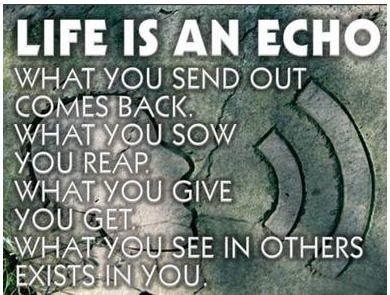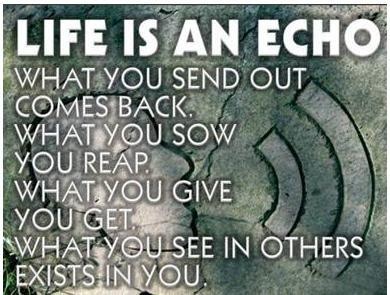This post completes, for the time being, the short series of post on customer loyalty. If you have not done so then you can access the first post here, and the second post here. Let’s close our exploration of the customer loyalty riddle.
Warning: your sterile, dogmatic corporate mind is not likely to find my conclusion satisfactory. If your sterile, corporate mind has delivered you loyal customers and filled up your coffers then you shouldn’t be reading this post. If it hasn’t then remember the saying “insanity: doing what you have always done and expecting/hoping for a different outcome”. If you are happy in the land of insanity, great. If, however, you are open to looking differently at the situation at hand then let’s continue our investigation. The “nugget to chew on” lies at the end of this post: first you have to make the effort to harvest that nugget – a lot like customer loyalty!
Let’s get back to the first post and the story that I shared with you
“There was once a Sufi who wanted to make sure that is disciples would, after his death, find the right teacher of the Way for them.
He therefore, after the obligatory bequests laid down by law, left his disciples 17 camels with this order:
‘You will divide the camels among the three of you in the following proportions: the oldest shall have half, the middle in age one third, and the youngest shall have one ninth.’
As soon as he was dead and the will was read, the disciples were at first amazed at such an inefficient disposition of their Master’s assets. Some said, ‘Let us own the camels communally’, other sought advice and then said, ‘We have been told to make the nearest possible division’, others were told by a judge to sell the camels and divide the money; and yet others held that the will was null and void because its provisions could not be executed.
Then they fell to thinking that there might be some hidden wisdom in the Master’s bequest, so they made inquiries as to who could solve insoluble problems.
“Everyone they tried failed until they arrived at the door of man called Ali. He said:
‘This is your solution. I will add one camel (of mine) to the number thus making 18 camels. Out of the 18 camels you will give half – 9 camels – to the oldest disciple. The second of you will get one third of the total, which is 6 camels. The youngest of you will get one ninth, which is 2 camels. That makes 17 camels which your master left you to divide amongst yourselves. One camel – my camel – will be left over and you will return that camel to me.’
This is how the disciples found the teacher for them.”
What are the key features / learnings of this parable?
The disciples looked in all the usual places, consulted all the usual experts, and got unsatisfactory answers – none, solved the riddle left by their master.
To solve the riddle the disciples had to go beyond the normal, the taken for granted, the obvious, the easy routes.
The disciples were looking for, committed, to getting something out of life – their share of their master’s assets. The thought that they had to put something into the game of life did not even enter their minds, nor of their tradition bound experts and gurus who looked at the riddle though the eyes of the economist.
The solution to the riddle was putting something into life: the difference that made all the difference because it took something unsatisfactory and made it complete, whole.
At a material level everyone got what they put into the game and nothing more: Ali put one camel into the game, he ended up with one camel at the end of the game; the disciples came with 17 camels and they left with seventeen camels.
Through wisdom Ali did away with the burden that the disciples were carrying / living with and simultaneously delivered the outcome that the disciples were looking for.
Through love (and wisdom) Ali won the hearts of the disciples without seeking to win anything. Why do I claim that Ali exercised love? Because he came from a stand of service – he could have told them to get lost, or he could have looked down upon them as being inferior and taken advantage.. And because he put something into the game: when he put one camel into the game he had no assurance that he would get his camel back. He granted trust. Read that again, he granted trust. You can only do that if you come from a context of ‘of service, of contribution, of love’ for your fellow-man, be that your customer, your supplier, your channel partner, your employee…..
How about this for the solution to the customer loyalty riddle?
If you have the ears to listen to my speaking you will get it and no commentary from me is needed. If you do not have the ears to hear it then no matter what I say, the time is not right for you and that is OK. Here is my take on the solution to the customer loyalty riddle, it is based on my lived experience and not on any theory:
Let me finish with a real story
An uneducated family man (wife, three children) worked in the factories of Yorkshire, England. One day to his surprise he found out that he had been fired. Turned out that his best friend had got into a fight and been fired. This best friend argued for his job back and told his supervisor that if he did not get his job back then he friend would also quit. The supervisor took him on his word: he fired them both.
Times were hard. The uneducated man looked here, there and everywhere for a job. He couldn’t find one and over the course of months he ran out of money. No money to feed the family. Finally, out of desperation this uneducated proud man who had known really difficult times (his father died when he was around 12, his substantial inheritance was stolen by his uncle, he worked from 12 years of age to support his mother, two brothers and two sisters) turned up at the grocery store to buy some food and yet he had no money. He went up that shopkeeper, explained his situation and asked for credit. The shopkeeper could have said no. From an economic, rational, perspective the right and only thing was to say “No, the economy is in a bad shape. You have no skills. You commitment to repay me for the food you are taking is not in doubt. Yet, your capacity to do so, is certain. No, I am not taking the risk”.
Instead, the shop keeper said something like this “Brother, take what you need. Pay me back when you can. One day you will find a job and all will be well. Until that day, I am here and you are welcome to take what you need on credit.” Previously, they had talked with each other but just about ‘the weather’ – the uneducated man had been buying from this man, this shop, for many years.
The uneducated man was my father, I was one of the children he had to feed. He NEVER forgot about that shopkeeper. The shopkeeper didn’t just feed my father and us. No, most importantly he fed my fathers hope, trust, confidence in himself and his fellow man. My father redoubled his efforts and found a job. The shopkeeper got paid for all that my father bought. And the two of them became the best of friends.
Now look at this photo again, perhaps with a completely different understanding:
Do you get it? Welcomers (and Richard Shapiro) get this intuitively, it is a core part of who they are, and they do this instinctively. Welcomers understand that it is what you put into the game that makes all the difference. Think about computers, think about music, think about computers, think about tablets. Why is it that Apple has revolutionised the game in each of these areas? Because of what the people at Apple put into the game as compared to competitors who were simply focussed on what they could get out of their customers. And there are no guarantees, Steve Job / NeXT failed, yet that does not matter if you love your fellow-man and are committed to a higher cause. Then everything is simply an obstacle on the way, a challenge that inspires us to be more creative, more resourceful and tests our commitment. Welcomers understand that as well – which is why they can deal with ‘difficult’ customers as gracefully as easy customers.
I thank you for your listening. I love you, I know that like me, you are a soul whose intentions are good. Remember that the same applies to our customers.




Splendid!
LikeLike
Hello Karl
That one word says ALL that there is to know about you. I totally get why you and I are in communication. We are not simply fruits of the same tree, we are the same tree!
At your service and with my love
Maz
LikeLike
Yes, Maz. Wonderful history! We can learn more about solidarity and honour! A great example! Congratulation!
LikeLike
Hello Joana
I am delighted to hear your voice here on The Customer Blog. I thank you for making a huge difference to a fellow human being – me. Your words lift me up and give me wings!
You and I are in agreement: solidarity and honour matter – they shape us and they make us better human beings, they create better/stronger/healthier families, communities, tribes, nations. And they all start with us – how we relate to one another: as human beings (“I-Thou”) or as objects (“I-It”).
With my love
Maz
LikeLike
Maz, thanks for a very poignant post. Stories are a great way to communicate important messages and the story about your dad was very insightful. Thanks for referring to the storekeeper as a welcomer. He definitely was!
LikeLike
Hello Richard
Great to hear your voice here on The Customer Blog – I appreciate and thank your making the time and the effort. I also value your kind words – they make a huge difference to me!
When it comes to stories, you and I are in agreement. I’d something though and that is that only certain kinds of stories really work their magic. And those stories have humanity and human concerns at their core. Furthermore, there is something about stories told in the first person and which show vulnerability that really speak to the ‘Elephant’ (the emotional core, the limbic brain) in us.
Once again, I value being in communication with you and I thank you for the caring words that you have gifted me with.
With my love
Maz
LikeLike
Hi Maz,
Wonderful story and reminds me of stories that my father has told me. They have have had a profound impact on my life, my beliefs, values and how I approach life.
Thank you for sharing,
Adrian
LikeLike